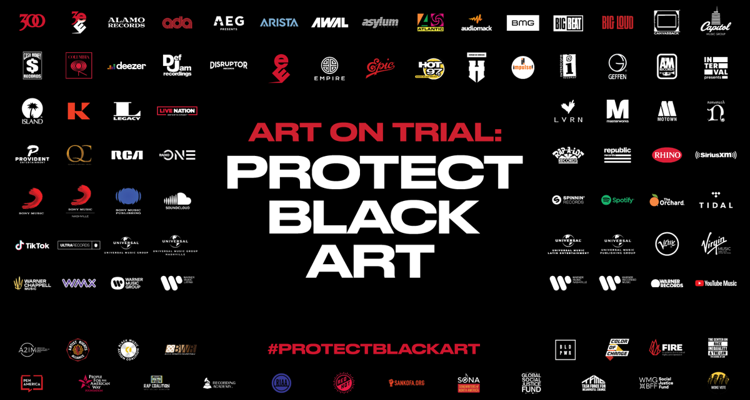Photo Credit: Warner Music Group
Several artists, industry leaders, and legal experts have released an open letter in a call to Protect Black Art.
The open letter was published in The New York Times and The Atlanta Journal-Constitution and urges legislators across the United States to limit how creative expression can be used against defendants on trial. The open letter specifically addresses the use of treating rap lyrics as criminal confessions.
The lengthy list of diverse signatories includes the Big Three (Warner, Sony, Universal) as well as BMG, Kobalt, Atlanta-based LVRN and Quality Control, AEG Presents, Audiomack, Deezer, Live Nation Entertainment, SiriusXM, SoundCloud, Spotify, TIDAL, TikTok, and YouTube Music, among many other industry bodies and associations.
“Beyond the obvious disregard for free speech and creative expression protected by the First Amendment, this racially targeted practice punishes already marginalized communities and their stories of family, struggle, survival, and triumph,” reads the letter in part.
“Throughout history, artists have created characters and forged narratives that reflect the culture around them,” adds Julie Greenwald, Chairman & CEO of WMG’s Atlantic Music Group. “That freedom of expression is essential to the creative process and the role of art in society. The harsh reality is that black artistic creativity is being threatened at an unprecedented level, and we must make every effort to stop this unethical, discriminatory approach to prosecution.”
Experts examining past legal cases have found more than 500 examples of rap lyrics used as evidence in public records. That number does not account for indictment proceedings, juvenile cases, or cases that end with a plea bargain–the overwhelming outcome in criminal prosecution. Researchers found only four instances of non-rap lyrics being submitted as evidence since the 1950s. Three of those cases were thrown out and one was overturned after conviction.
Some state legislators are already taking action to protect artistic expression. California Governor Newsom signed a bill into law that requires prosecutors to satisfy stringent requirements before lyrics can be entered as evidence in a criminal trial. Other bills are in consideration in New York and New Jersey. The RAP Act (Restoring Artistic Protection) has also been introduced in the U.S. Congress by Rep. Hank Johnson (D-GA) and Rep. Jamaal Bowman (D-NY).
The full letter is published below.
“In courtrooms across America, the trend of prosecutors using artists’ creative expression against them is happening with troubling frequency. Regardless of the medium – music, the visual arts, writing, television, film – fans implicitly understand that creative expression is rooted in what artists see and hear; it’s a reflection of the times we live in. The final work is a product of the artist’s vision and imagination.”
“Rappers are storytellers, creating entire worlds populated with complex characters who can play both hero and villain. But more than any other art form, rap lyrics are essentially being used as confessions in an attempt to criminalize Black creativity and artistry.”
“For example, currently in Georgia’s Fulton County, numerous members of the Young Stoner Life record label, led by Grammy-winning artist Jeffery Lamar Williams (aka Young Thug), are facing more than 50 allegations, including RICO charges that the label is a criminal gang. The allegations rely heavily on the artists’ lyrics, which prosecutors claim are ‘overt evidence of conspiracy.’ In the indictment, Fulton County prosecutors argue that lyrics like ‘I get all type of cash, I’m a general’ are a confession of criminal intent.”
“The use of lyrics against artists in this way is un-American and simply wrong. Beyond the obvious disregard for free speech and creative expression protected by the First Amendment, this racially targeted practice punishes already marginalized communities and their stories of family, struggle, survival, and triumph.”

